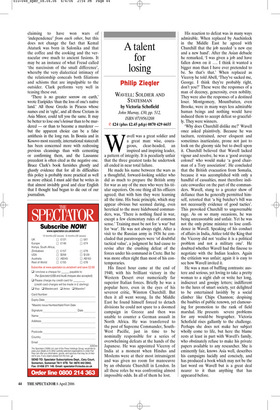A talent for losing
Philip Ziegler
WAVELL: SOLDIER AND STATESMAN by Victoria Schofield John Murray, £30, pp. 512, ISBN 0719563208 V £24 (plus £2.45 p&p) 0870 429 6655 Wavell was a great soldier and a great man: wise, courageous, clear-headed, an inspired and inspiring leader, a pattern of integrity. It is peculiarly unfair that the three greatest tasks he undertook all ended in near total failure.
He made his name between the wars as a thoughtful, forward-looking soldier who did as much to prepare the British army for war as any of the men who were his titular superiors. On one thing all his officers agreed; that with him they were learning all the time. His basic principle, which may appear obvious but seemed daring, even heretical to the more hidebound commanders, was, ‘There is nothing fixed in war, except a few elementary rules of common sense.’ Training must be not for ‘a war’ but for ‘war’. He was not always right. After a visit to the Russian army in 1936 he concluded that paratroopers were ‘of doubtful tactical value’, a judgment he had cause to revise after the crushing defeat of the forces under his command in Crete. But he was more often right than most of his contemporaries.
His finest hour came at the end of 1940, with his brilliant victory in the Western Desert over numerically far superior Italian forces. Briefly he was a popular hero, even in the eyes of his severest critic, Winston Churchill. But then it all went wrong. In the Middle East he found himself forced to detach divisions he could not spare to a doomed campaign in Greece and then was unable to counter a German assault in North Africa. He was transferred to the post of Supreme Commander, SouthWest Pacific, just in time to be nominally responsible for a series of overwhelming defeats at the hands of the Japanese. He was appointed Viceroy of India at a moment when Hindus and Moslems were at their most intransigent and was given no room for manoeuvre by an obdurate Churchill in London. In all these roles he was confronting almost impossible odds. In all of them he lost. His reaction to defeat was in many ways admirable. When replaced by Auchinleck in the Middle East he agreed with Churchill that the job needed ‘a new eye and a new hand’. After the Asian debacle he remarked, ‘I was given a job and have fallen down on it .... I think it wanted a bigger man than I have ever pretended to be. So that’s that.’ When replaced as Viceroy he told Abell, ‘They’ve sacked me, George. I think they’re probably right, don’t you?’ These were the responses of a man of decency, generosity, even nobility. They were also the responses of a destined loser. Montgomery, Mountbatten, even Brooke, were in many ways less admirable human beings and nothing would have induced them to accept defeat so gracefully. They were winners.
‘Why does Churchill dislike me?’ Wavell once asked plaintively. Because he was taciturn, restrained, never eloquent and sometimes inarticulate, prone not just to look on the gloomy side but to dwell upon it. Churchill believed that Wavell lacked vigour and resolve, he was a ‘good average colonel’ who would make ‘a good chairman of a Tory association’. He concluded that the British evacuation from Somalia, because it was accomplished with only a handful of casualties, must therefore indicate cowardice on the part of the commanders. Wavell, stung to a greater show of defiance than he generally permitted himself, retorted that ‘a big butcher’s bill was not necessarily evidence of good tactics’. This provoked Churchill to ungovernable rage. As on so many occasions, he was being unreasonable and unfair. Yet he was not the only prime minister to lose confidence in Wavell. Speaking of his conduct of affairs in India, Attlee told the King that the Viceroy did not ‘realise it is a political problem and not a military one’. He doubted whether Wavell had the finesse to negotiate with the Indian leaders. Again the criticism was unfair; again it is easy to see how Wavell invited it.
He was a man of baffling contrasts: austere and serious, yet loving to take a pretty woman to a night club or write her long, indiscreet and gossipy letters; indifferent to the lures of smart society, yet delighted to be entertained lavishly by a social climber like Chips Channon; despising the baubles of public renown, yet clamouring for promotion to the rank of field marshal. He presents severe problems for any would-be biographer. Victoria Schofield rises gallantly to the challenge. Perhaps she does not make her subject wholly come to life, but here the blame rests at least in part with Wavell’s family, who obstinately refuse to make his private papers available to any researcher. She is eminently fair, knows Asia well, describes his campaigns lucidly and concisely, and has produced a book which may not be the last word on Wavell but is a great deal nearer to it than anything that has appeared before.










































































 Previous page
Previous page